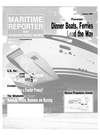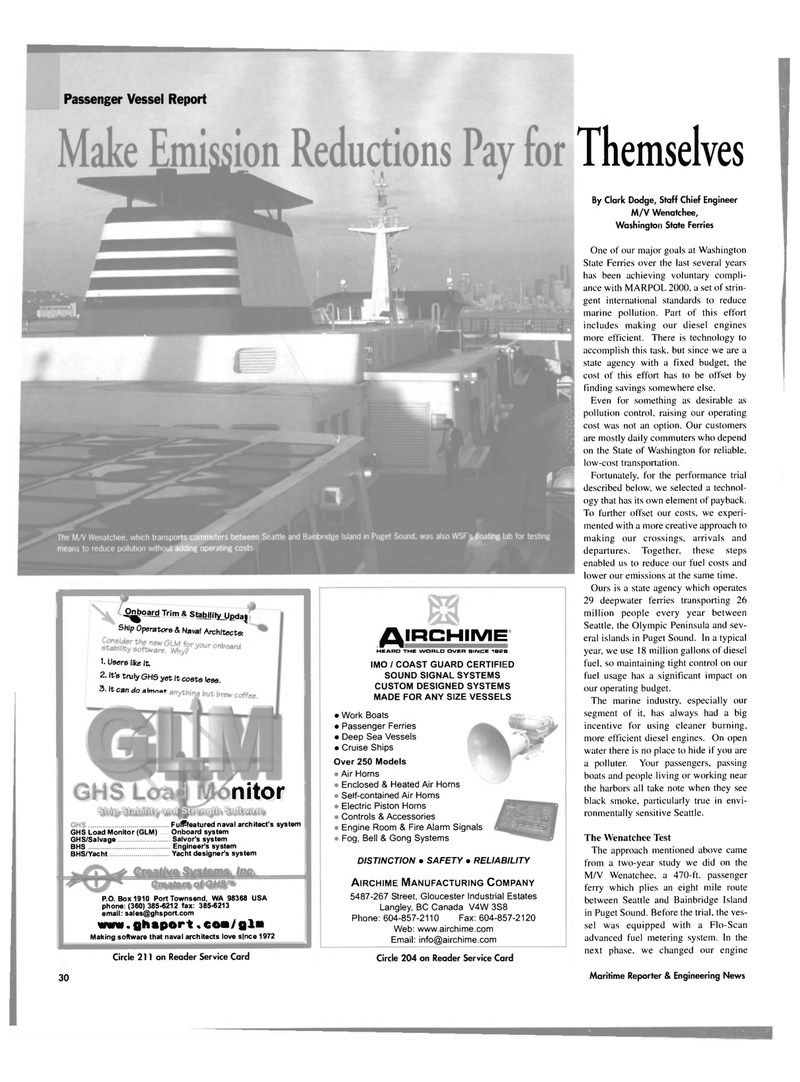
Page 30: of Maritime Reporter Magazine (January 2004)
Ferry & Passenger Vessel Yearbook
Read this page in Pdf, Flash or Html5 edition of January 2004 Maritime Reporter Magazine
Passenger Vessel Report
Themselves
By Clark Dodge, Staff Chief Engineer
M/V Wenatchee,
Washington State Ferries
One of our major goals at Washington
State Ferries over the last several years has been achieving voluntary compli- ance with MARPOL 2000, a set of strin- gent international standards to reduce marine pollution. Part of this effort includes making our diesel engines more efficient. There is technology to accomplish this task, but since we are a state agency with a fixed budget, the cost of this effort has to be offset by finding savings somewhere else.
Even for something as desirable as pollution control, raising our operating cost was not an option. Our customers are mostly daily commuters who depend on the State of Washington for reliable, low-cost transportation.
Fortunately, for the performance trial described below, we selected a technol- ogy that has its own element of payback.
To further offset our costs, we experi- mented with a more creative approach to making our crossings, arrivals and departures. Together, these steps enabled us to reduce our fuel costs and lower our emissions at the same time.
Ours is a state agency which operates 29 deepwater ferries transporting 26 million people every year between
Seattle, the Olympic Peninsula and sev- eral islands in Puget Sound. In a typical year, we use 18 million gallons of diesel fuel, so maintaining tight control on our fuel usage has a significant impact on our operating budget.
The marine industry, especially our segment of it. has always had a big incentive for using cleaner burning, more efficient diesel engines. On open water there is no place to hide if you are a polluter. Your passengers, passing boats and people living or working near the harbors all take note when they see black smoke, particularly true in envi- ronmentally sensitive Seattle.
The Wenatchee Test
The approach mentioned above came from a two-year study we did on the
M/V Wenatchee, a 470-ft. passenger ferry which plies an eight mile route between Seattle and Bainbridge Island in Puget Sound. Before the trial, the ves- sel was equipped with a Flo-Scan advanced fuel metering system. In the next phase, we changed our engine
Maritime Reporter & Engineering News ^^^TrLm^St^ityjj^dal
Ship Operators & Naval Architects: 1. Users like It. 2. It's truly GH5 yet it costs less. 3. It can do a\mnat. nitor
P.O. Box 1910 Port Townsend, WA 98368 USA phone: (360) 385-6212 fax: 385-6213 email: [email protected] www.ghsport»COM/gl»
Making software that naval architects love since 1972
Circle 211 on Reader Service Card 30 /\IRCHIIV1E
HEARD THE WORLD OVER SINCE 1323
IMO / COAST GUARD CERTIFIED
SOUND SIGNAL SYSTEMS
CUSTOM DESIGNED SYSTEMS
MADE FOR ANY SIZE VESSELS • Work Boats • Passenger Ferries • Deep Sea Vessels • Cruise Ships
Over 250 Models
DISTINCTION • SAFETY • RELIABILITY
AIRCHIME MANUFACTURING COMPANY 5487-267 Street, Gloucester Industrial Estates
Langley, BC Canada V4W 3S8
Phone: 604-857-2110 Fax: 604-857-2120
Web: www.airchime.com
Email: [email protected]
Circle 204 on Reader Service Card
FulPfeatured naval architect's system
Onboard system
Salvor's system
Engineer's system
Yacht designer's system
GHS Load Monitor (GLM)
GHS/Salvage
BHS
BHS/Yacht........................
Air Horns
Enclosed & Heated Air Horns
Self-contained Air Horns
Electric Piston Horns
Controls & Accessories
Engine Room & Fire Alarm Signals
Fog, Bell & Gong Systems

 29
29

 31
31
